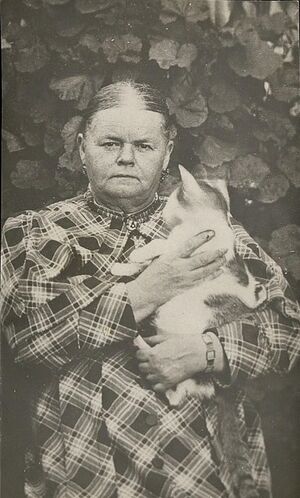Aleksandr Khimichenko and Natalya Plesskaya: Difference between pages
No edit summary |
No edit summary |
||
| Line 1: | Line 1: | ||
{{picture|file= | {{picture|file=Natalya Plesskaya.jpg|caption='''Natalya Plesskaya''' (b. 1837)}} | ||
Cousin to the composer's brother-in-law [[Lev Davydov]] (b. 1837), born '''''Natalya Andreyevna Plesskaya''''' (Наталия Андреевна Плесская), sometimes also spelled ''Pleskaya'' (Плеская). | |||
Natalya was a close friend of the composer's sister [[Aleksandra Davydova|Aleksandra]], and a cousin to his brother-in-law [[Lev Davydov]] (1837–1896). Tchaikovsky was very fond of Natalya Plesskaya, and admired her sunny disposition and ready wit. | |||
In | ==Dedications== | ||
In 1878, Tchaikovsky wrote a ''[[Nathalie-Valse]]'' for Natalya Plesskaya. He retained the dedication of this piano piece when it was reworked as ''Natha-Valse'', No. 4 of the [[Six Pieces, Op. 51]] (1881). | |||
==Correspondence with Tchaikovsky== | ==Correspondence with Tchaikovsky== | ||
16 letters from Tchaikovsky to Natalya Plesskaya have survived, dating from 1879 to 1893. Those highlighted in bold have been translated into English on this website: | |||
* '''[[Letter | * [[Letter 1060]] – 6/18 January 1879, from [[Clarens]] | ||
* '''[[Letter | * [[Letter 1376]] – 13/25 December 1879, from [[Rome]] | ||
* [[Letter 1388]] – 23 December 1879/4 January 1880, from [[Rome]] | |||
* [[Letter 1941]] – 22 January/3 February 1882, from [[Rome]] | |||
* [[Letter 1986]] – 6/18 March 1882, from [[Naples]] | |||
* [[Letter 2014]] – 4/16 May 1882, from [[Kamenka]] | |||
* [[Letter 2269]] – 20 April/2 May 1883, from [[Paris]] | |||
* [[Letter 2330]] – 16/28 August 1883, from [[Podushkino]] | |||
* [[Letter 2333]] – 22 August/3 September 1883, from [[Podushkino]] | |||
* [[Letter 2536]] – 28 August/9 September 1884, from [[Skabeyevo]] | |||
* [[Letter 2687]] – 15/27 April 1885, from [[Maydanovo]] | |||
* [[Letter 2744]] – 31 July/12 August 1885, from [[Maydanovo]] | |||
* '''[[Letter 3640a]]''' – 11/23 August 1888, from [[Frolovskoye]] | |||
* [[Letter 4859]] – 6/18 February 1893, from [[Klin]] | |||
* '''[[Letter 4907]]''' – 5/17 April 1893, from [[Klin]] | |||
* '''[[Letter 4958]]''' – 19 June/1 July 1893, from [[Grankino]] | |||
250 letters from Natalya Plesskaya to the composer, dating from 1878 to 1893, are preserved in the {{RUS-KLč}} at [[Klin]] (a{{sup|4}}, Nos. 3363–3612) <ref name="note1"/> | |||
==Bibliography== | ==Bibliography== | ||
* {{bib| | * {{bib|1938/67}} (1938) | ||
* {{bib| | * {{bib|1951/51}} (1951) | ||
==Notes and References== | ==Notes and References== | ||
<references> | <references> | ||
<ref name="note1"> | <ref name="note1">Including one letter dating from 5/17-10/22 January 1891, written jointly by Plesskaya and the composer's sister [[Aleksandra Davydova|Aleksandra]] (a{{sup|4}}, No. 3582).</ref> | ||
</references> | </references> | ||
[[Category:People| | |||
[[Category:Correspondents| | [[Category:People|Plesskaya, Natalya]] | ||
[[Category:Correspondents|Plesskaya, Natalya]] | |||
__NOTOC__ | __NOTOC__ | ||
Revision as of 10:05, 20 August 2023
Cousin to the composer's brother-in-law Lev Davydov (b. 1837), born Natalya Andreyevna Plesskaya (Наталия Андреевна Плесская), sometimes also spelled Pleskaya (Плеская).
Natalya was a close friend of the composer's sister Aleksandra, and a cousin to his brother-in-law Lev Davydov (1837–1896). Tchaikovsky was very fond of Natalya Plesskaya, and admired her sunny disposition and ready wit.
Dedications
In 1878, Tchaikovsky wrote a Nathalie-Valse for Natalya Plesskaya. He retained the dedication of this piano piece when it was reworked as Natha-Valse, No. 4 of the Six Pieces, Op. 51 (1881).
Correspondence with Tchaikovsky
16 letters from Tchaikovsky to Natalya Plesskaya have survived, dating from 1879 to 1893. Those highlighted in bold have been translated into English on this website:
- Letter 1060 – 6/18 January 1879, from Clarens
- Letter 1376 – 13/25 December 1879, from Rome
- Letter 1388 – 23 December 1879/4 January 1880, from Rome
- Letter 1941 – 22 January/3 February 1882, from Rome
- Letter 1986 – 6/18 March 1882, from Naples
- Letter 2014 – 4/16 May 1882, from Kamenka
- Letter 2269 – 20 April/2 May 1883, from Paris
- Letter 2330 – 16/28 August 1883, from Podushkino
- Letter 2333 – 22 August/3 September 1883, from Podushkino
- Letter 2536 – 28 August/9 September 1884, from Skabeyevo
- Letter 2687 – 15/27 April 1885, from Maydanovo
- Letter 2744 – 31 July/12 August 1885, from Maydanovo
- Letter 3640a – 11/23 August 1888, from Frolovskoye
- Letter 4859 – 6/18 February 1893, from Klin
- Letter 4907 – 5/17 April 1893, from Klin
- Letter 4958 – 19 June/1 July 1893, from Grankino
250 letters from Natalya Plesskaya to the composer, dating from 1878 to 1893, are preserved in the Tchaikovsky State Memorial Musical Museum-Reserve at Klin (a4, Nos. 3363–3612) [1]
Bibliography
Notes and References
- ↑ Including one letter dating from 5/17-10/22 January 1891, written jointly by Plesskaya and the composer's sister Aleksandra (a4, No. 3582).

